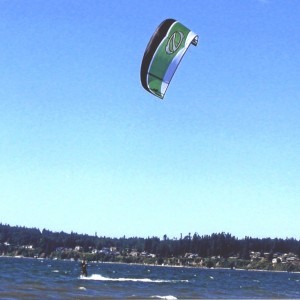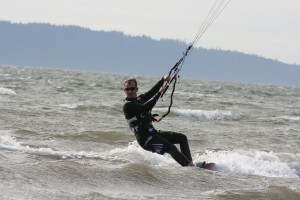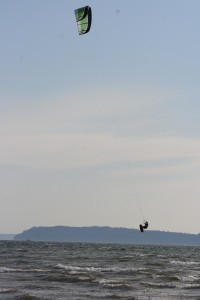Burning Calories With…Kiteboarding?
Some of you may know that I've been an avid kiteboarder for the past 3 years now:
Those are pictures of me kiteboarding at Jetty Island in Everett, Washington. I've always wondered how many calories I burn while doing this. Interestingly, a study was published last year which can give me a rough estimate.
This study looked at the heart rate and oxygen uptake (the amount of oxygen your body is using to produce energy aerobically) of a group of kitesurfers while riding a course designated by a group of buoys. The researchers found that the kitesurfers achieved heart rates of around 80% of their maximum heart rates (the maximum heart rates were determined by a treadmill test). I thought this was interesting because I often have no clue where my heart rate is while I'm riding, and evidently it gets higher than I thought than it would get. Of course, the researchers were simulating kiteboard racing conditions, which is more intense than regular riding, so my heart rate likely does not get that high if I'm just "mowing the lawn" (leisurely riding back and forth) as it's called. Of course, if I'm actually kiting aggressively (jumping, trying new tricks), then it can get more intense.
The oxygen uptake was estimated to be around 60% of the subjects' maximal oxygen uptake (again determined by the treadmill test). We can use this number to get a rough estimate of the calories burned. There is a concept called metabolic equivalents (METs), which gives us an idea of how intense an activity is in relation to rest. One MET is equivalent to the oxygen uptake while we're at rest; this is typically assumed to be 3.5 milliliters of oxygen for every kilogram of body weight, per minute (3.5 ml/kg/min). Thus, an activity that takes 4 METs is one that takes 4 times the oxygen uptake of rest. Vigorous activities can be 10 METs or more.
In this study, the kitesurfers had average oxygen uptakes of 35 to 40 ml/kg/min. If we divide this by 3.5, that gives us 10 to 11 METs. We can use this to estimate the calories burned using the following equation:
Calories Burned Per Minute = METs * 3.5 * (bodyweight in kilograms / 200)
I weigh about 176, which is 80 kilograms. If we assume around 10 METs for kitesurfing, that would give me a calorie burn of:
10 * 3.5 * (80 / 200) = 14 calories per minute
Now, that's for aggressive racing. I typically will ride for about 2 hours, mixing in aggressive riding with more leisurely riding. Let's say that I average 7 METs over that 2 hours. That would give me a calorie burn of:
7 * 3.5 * (80/200) = 9.8 calories per minute
9.8 calories per minute * 120 minutes = 1176 calories
That's a decent amount of calorie burn, typically what you would get from moderate cardio performed for a couple hours.
One limitation of this study was that oxygen uptake was estimated from the heart rate response, rather than directly measured. This might cause an overestimation of the oxygen uptake; kitesurfing involves a lot of isometric muscle contraction, which will exaggerate the heart rate response. The researchers assumed a linear relationship between oxygen uptake and heart rate (the relationship was determined from the treadmill test, and generally holds true for most steady, rhythmic aerobic exercise), but because the isometric contractions may have artificially elevated the heart rate, the true oxygen uptake may be lower than what was estimated. This would also mean the number of calories burned was less.
Nevertheless, if you're looking for a fun recreational activity that will give you a good boost in your energy expenditure, and you live in a place that's got both water and wind, then you should give kiteboarding a try. In fact, I find it so addicting that I might ride for 2-3 hours without stopping (or eating), so it's great for creating an energy deficit. This is not to mention the exercise involved in pumping up your kite, as well as the trek involved in getting to some spots (Jetty Island involves rowing across a channel, then walking with your gear on your back for about a mile to the north end of the island). Plus, you can take your gear anywhere in the world...I've kited in Maui and Oahu, for example. Here's a video my wife took of me kiting in Maui (music courtesy Joe Satriani):
[myspacetv 31786371]
And if you get more advanced and start jumping, then it can be an amazing core workout...my abs will be sore for days after a session. It's like doing hanging leg raises while being violently yanked into the air at the same time.
If you do decide to try it out, make sure you get lessons...it can be dangerous if you don't know what you're doing. The kites have a lot of power, and injuries (even death) can happen.




Good article! thanks a lot for the info
You’re welcome Jose!
Awesome bro. Wonder how many calories you burn whilst swinging under your kite into a massive transition kiteloop with a grab. Certainly more than sitting on the couch.
For endurance, do circuit training of 30 x squats, 30 x press ups, 30 x bent over flys, 30 x sit ups etc until you cannot do any more, then repeat.
Also regular strenuous exercise like kayaking/paddle boarding, surfing, will keep your fitness level in check for regular riding. The best exercises/training is kiting, coupled with cross training exercises.
Happy kiteloops and always remember to get inverted
Thanks for a great article! What I wonder is if the amount of burned calories increase if you kiteboard in cold water? In Sweden where I kiteboard the water is usually just around 15 degrees. Right now it´s not even 10 degrees! We have wetsuits of course, but it´s usually freaking cold!
I love Kiteboarding, but my muscles tend to get pretty fatigued after riding for 45mins.
Just curious do you have any specific exercises you recommended for increasing endurance? You said “kitesurfing involves a lot of isometric muscle contraction” would you then recommended isometric training specifically for kiteboarding?
Cool 🙂
Nice article James,
I can’t count how many times I’ve wondered this exact question. See you on the water. Thanks for the info.
Matt